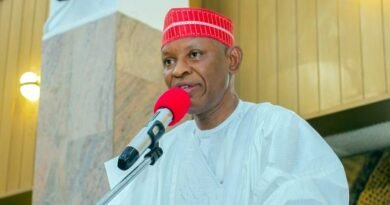Rafsanjani Urges FG to Redirect Fuel Subsidy Savings to Infrastructure, Not ‘Insensitive’ N8,000 Monthly Palliative
Auwal Musa Rafsanjani, Executive Director of the Civil Society Legislative Advocacy Centre, has criticized the proposed N8,000 monthly palliative by the Federal Government for 12 million households, calling it insensitive.
He suggested that the government should use the subsidy savings to fix the transport and energy sector, as 27% of the country’s average household depends on fuel-related expenses, rather than putting it into a wasteful exercise.
Rafsanjani stated in a Friday statement that the palliative, which will be funded through a loan, will add to the country’s debt burden, and that Nigeria already has a high debt profile and does not need to incur more debt to distribute palliatives.
He said: “The insensitivity behind this is alarming, particularly in light of the country’s growing and unsustainable debt profile. At this crucial time of post-covid recovery when the increasing cost of governance underpinned by high personnel and overhead costs are weighing down on the federation purse; steps should be taken towards restructuring and rationalizing government parastatals, agencies and commissions to address these costs; 30% of the annual budgets barely goes into capital projects; the government has never achieved more than 40% budget performance; and domestic and local debts are piling.
“Given our current fiscal situation there must be stringent measures to address these depletions and deficits. Nigeria’s external debt is about 40% of its projected N77 trillion debt stock, most of which is to multilateral creditors like the World Bank at 47% and more worrisomely to Commercial lenders (private creditors) at 39%, with debt service to revenue ratio projected by the World Bank to increase from 100.2 per cent in 2022 to 123.4 per cent of federal revenue in 2023 and possibly hit 160 per cent in five years except broad-based reforms are implemented to “unfreeze” the financial landscape.
Mr Rafsanjani who heads Transparency International in Nigeria, also stated that another reason for kicking against the disbursement of palliative is due to the lack of transparency by the government, which according to him, was seen during the Covid-19 pandemic.
He said there has to be a guarantee of transparency in the disbursement of this new palliative, adding that the palliatives should be disbursed through the 774 local government areas in the country, at 1.04 billion naira per local government.
He also said that as a means of utilizing the funds, local governments can use the money on things of social benefit which will directly impact the lives of the people.
Rafsanjani further called for a wider stakeholder consultation, adding that the government should not shut out Nigerians from planning and monitoring the processes.
“The concerns about the transparency of palliative disbursement processes are cogent as Nigerians have a fresh memory of palliative administrations during the COVID-19 pandemic. In more recent times, we have witnessed the inefficiency and lack of transparency that trailed interventions like the Nigeria Incentive-based Risk Sharing System for Agricultural Lending (NIRSAL) Microfinance Bank SME/Household loan and Anchor Borrower’s Programme, just to mention a few.
“More worrisomely, a breakdown of the amended N819.5 billion supplementary budget shows that N500 billion is set aside for palliatives to cushion the effect of recent fuel subsidy removal, N185 billion for the Ministry of Works and Housing to alleviate the impact of the flooding disaster suffered in the country in 2022 on road infrastructure across the six geopolitical zones, N19.2 billion for the Ministry of Agriculture to ameliorate the massive destruction to farmlands across the country during the flooding experienced last year; N35 billion to the National Judicial Council; N10 billion to the Federal Capital Territory Administration for critical projects; and N70 billion for the National Assembly to support the working conditions of new members. There is a seeming lack of clarity and sincerity of purpose behind this sharing formula and its illogical rationale as a further breakdown suggests that each of the 469 legislators gets about N24 million each, while the more vulnerable public beneficiaries get N8000 each monthly.
“The funds should be administered through the 774 local governments at N1.04 billion per LGA, with each setting up a committee that will consist of community leaders, civil society groups, religious leaders and political leaders for effective monitoring. On the other hand, the LGAs could be required to utilize the funds (N1.04 billion) in a manner that is consistent with maximizing social benefits in public expenditure, for instance through effectively monitored establishment or rehabilitation of public health care centres, health insurance schemes, skill acquisition centres or similarly robust initiatives.
“Lastly, the need for wider stakeholder consultations cannot be over-emphasized as it is crucial to public trust and acceptability. We encourage the new government not to tow the path of the previous one in excluding Nigerians from planning and monitoring processes both from a rights-based and outcome-based perspective. Civil society actors have harmonized positions on various economic issues which should be given due consideration and a space should be provided for engagement with civic actors as voices of the people,” the statement reads.





